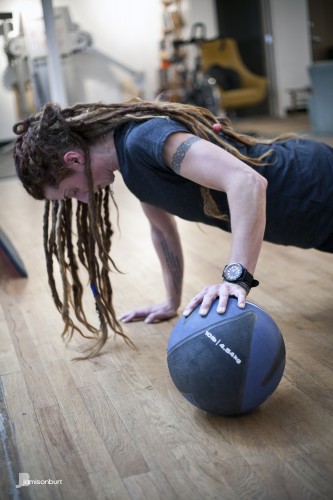Training Endurance, Strength and Power for Climbing
By Mercedes Pollmeier
If you are looking to make faster progress towards your climbing goals it is essential to include strength training into your regime. Whether you view climbing as a sport or activity, there is no doubt that a climber has to supplement their training with weight/strength training if they are looking to perform at a higher level. Look at all other sports and activities. For the most part, the athletes performing at the highest levels are also putting time in the gym to give them the edge. Strength training with weights will allow you feel stronger on routes as well as train the metabolic system required for climbing.
So, now that you are convinced that weight/strength training will help you reach your goals for climbing, you need to structure your workouts based on the season and time period you have for reaching your goal. Remember, make attainable goals, and continue to make new goals as you progress.
To start a solid training regime, you need to follow the progression of endurance, strength and power. This not only helps you peak for your project/season, but it also keeps you from getting injured. You also need to keep in mind that climbing also incorporates the lower body. It always surprises me that when I see a climber working out, they are sooo focused on ab and arm training. Your legs are part of your core, and are the base of support as well as the initiator of movement. So, make sure to include lower body exercises as well! (* A note for female climbers – we tend to suffer from the Q angle syndrome, which means that we have a very high chance of tearing our ACL’s. By training proper lower body mechanics, we can function better and avoid the chances of lower body injury. Mostly it’s the knee and hip movement that we need to keep an eye on)
Below is a sample of a strength workout. This is purely just the weight-training component. This does not include other important aspects that need to be incorporated into your training regime such as campus board, systems wall and cardio workouts. Other climbing specific exercises such as front levers, rope climbs, hanging legs raises etc, can also be incorporated into this program. The exercises selected are basic body movements that work the large muscle groups that will no doubt help you climb harder and function better.
Here is a sample progressive workout. This can be done 2-3 days a week. Work into it slowly! In addition to this, you can choose to take active rest periods. This is generally done every 4th week of the training program. You can still climb during this period, but try to keep the volume low. All physical adaptations from training occur during the recovery period!!
Endurance (3-6wks): 3-6 sets, 10-20 reps (you gotta feel the burn!), 30s-1min rest in between.
Body Weight (BW) squats
BW single leg squats
Hamstring extensions on the ball.
Pull ups *(50-75% 1RM)
push ups (50-75% 1RM)
Dumbbell chest press (50-75% 1RM)
Plank
Jump rope (considered plyometric, but great for building those calf muscles, do 5-15mins)
Strength (3-6Wks): 3-5 sets, 4-8 reps, 30s-1min rest. Weight selected should be progressed from 75-90% 1RM.
Squats
Straight leg dead lift
Weighted pull ups
Weighted push ups
Weighted dips
weighted single leg squats
Windshield wipers
Weighted plank
Cable rows
Box jumps (1ft height, ~25 reps)
Power (3-6wks): 1-3 sets, 1-5 reps, 1-3min rest. Weight selected should be progressed form 80-95% 1RM)
Power clean
Squat to overhead press
weighted pull ups
weighted push ups
Dumbbell chest press
Bent over rows
box jumps (2ft height)
* 1RM means the maximum weight you can lift once. i.e. if you can chest press 100lbs, your 50%1RM would be 50lbs. If you can only do 1 pull up, use a bungee or resistance band to help you do more reps.
This entry was posted on Wednesday, September 5th, 2012 at 6:30 am and is filed under Articles, Training. You can follow any responses to this entry through the RSS 2.0 feed. You can leave a response, or trackback from your own site.
Leave a Reply
You must be logged in to post a comment.
Analytics Plugin made by VLC Media Player




